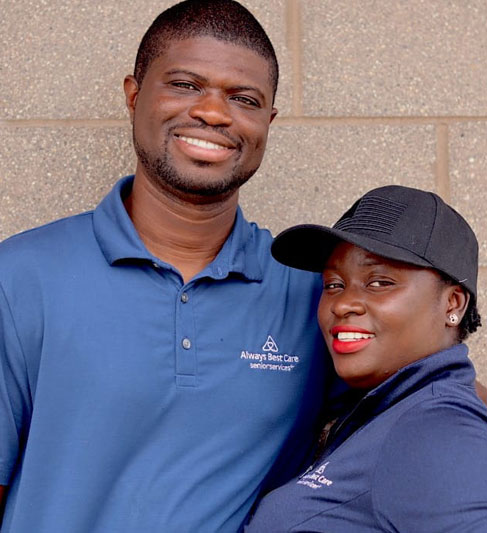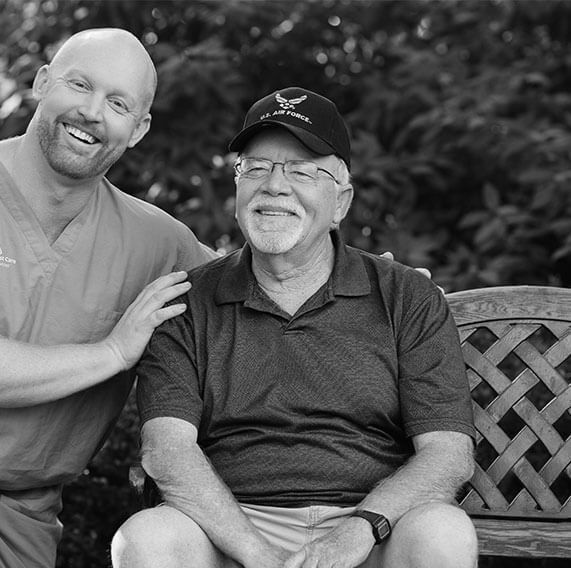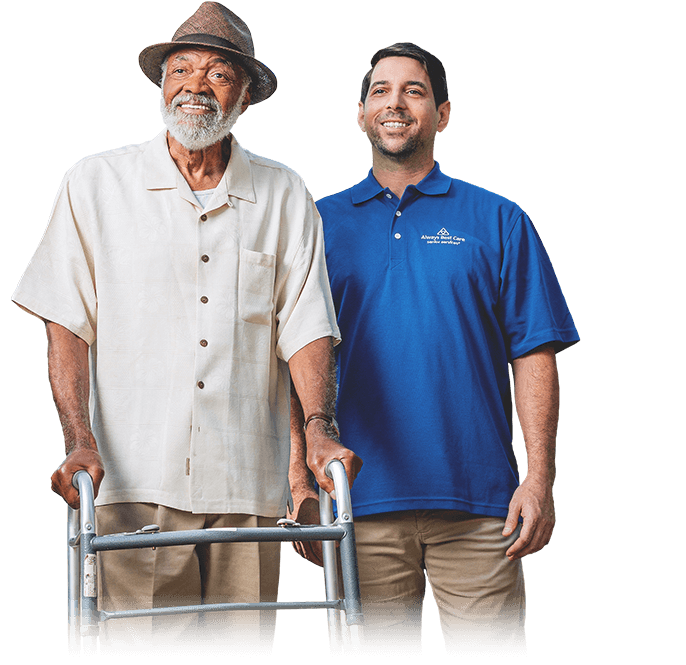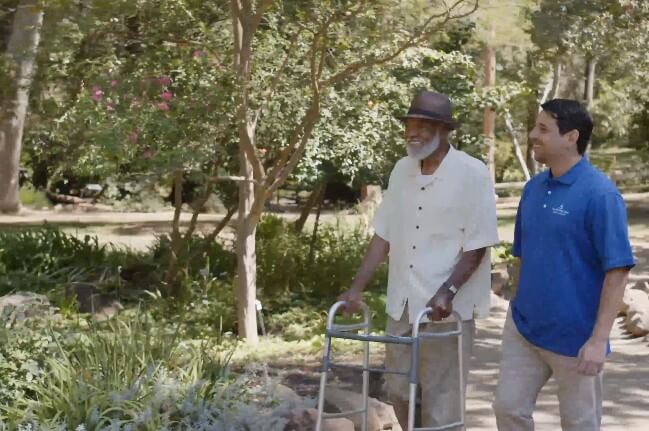Team of Caring Professionals
We are a team of caring and compassionate professionals working together to provide the best possible care for you and your loved ones
The Most Reliable Senior Care
Please submit this form below and we will chat shortly!

Always Best Care combines national strength and standards with local accessibility and personal service. The owners of Always Best Care of Cedar Rapids are David and Kehinde Ogunnoiki. David and Kehinde and their team have your loved ones best interest at heart, and will ensure that exceptional service and care is provided to all family members.


We match our clients with the most appropriate living options

We are a team of caring and compassionate professionals working together to provide the best possible care for you and your loved ones
We have worked with thousands of seniors and their families across the U.S. and Canada, providing the best service each step of the way
Our team of professional caregivers has a proven track record of providing expert care to seniors and people with special needs
We help people with specific needs maintain a safe, independent, and dignified lifestyle with in-home care, senior community referral services and special care services
Discover our services to find the right care solution for you and your loved ones
Expert care services, delivered in the comfort of your home
Referral services designed to help you find the right senior living community
Specialized health monitoring services, powered by advanced healthcare technology
Helping veterans navigate the financing options available from the VA to receive the best care possible
Your local Always Best Care team helps families throughout Cedar Rapids and the surrounding areas


ALWAYS THERE FOR YOU ALWAYS BEST CARE
“Tracey Gray helped me in the biggest way today! She saved my day and I”
“Always best care provided excellent caregivers to us. I am really happy with the care”
“On behalf of my family, I would like to thank Always Best care for all”
“Always Best Care in Cedar Valley IA realy helps me a lot. They have Reliable”
“Tracey Gray helped me in the biggest way today! She saved my day and I am so thankful for her choice to help me! Thank you! #CertPrint #AlwaysBestCare”
“Always best care provided excellent caregivers to us. I am really happy with the care and support they provided to my father. Highly recommended to all!”
“On behalf of my family, I would like to thank Always Best care for all the support your caregivers have provided to my mother. She was very pleased with the care she received. I confidently recommend Always Best Care to all.”
“Always Best Care in Cedar Valley IA realy helps me a lot. They have Reliable Caregivers who helped me to take care of my loved one for several years. They are highly trained and managed well the daily routines and activities like bathing and dressing. Caregivers of always best care is dependable and passionate to their work. I am satisfied and so glad that I chose their service. Highly recommend whoever needs their caregiving service!”
Discover our porfolio of technology and special care services, designed to cater to the needs of you and your loved ones.
A complimentary telephone reassurance program that provides companionship to seniors and disabled adults
A computerized balance assessment tool that provides an objective, accurate, and reliable fall risk assessment
Always Best Care helps seniors and their family through the entire process. Our care coordinators are local and have in-depth knowledge of our senior living partners and services.


We are very proud of our awards and recognitions of excellence in the senior care industry


Our passion for helping people maintain a safe, independent and dignified lifestyle represents the strong foundation of
Always Best Care
Our employees are our own – not contractors. Caregivers are thoroughly screened, trained and insured. We are dedicated to exceeding your expectations…always.

Whether you are an experienced caregiver or looking to launch your career, contact us today to learn about opportunities that may be available in your area


It’s becoming more and more common for families to live far apart from each other, and leaving an elderly relative alone at home can be a major source of anxiety if you’re not nearby. Always Best Care provides the reassurance you need that your loved ones are safe and happy, with a compassionate caregiver available in case of an emergency. We’ll help them handle their daily tasks so that you can manage your own life with confidence and peace of mind. In addition, home care is often considered a healthier and more affordable option for families when compared to long-term nursing facilities.
Choosing an in-home senior care provider can be a daunting task. However, there are a few guidelines to keep in mind. First, ask your friends and family for recommendations. If you’re unable to get any suggestions, search for local and state organizations that recognize the best providers in the industry. Doing so can help narrow down a shortlist of home care agencies. Next, set up meetings with your top choices and ensure that they meet your criteria. Don’t forget to ask your senior for their opinion, too. Doing so will help you make an informed home care decision.
When hiring an in-home care provider, it’s important to ensure that they are insured to protect you and your loved one. Always Best Care not only provides our clients with insurance coverage but also Worker’s Compensation. That way, in the unlikely event that an accident occurs while a caregiver is working in your loved one’s home, you are protected against any claims or damages. These protections not only benefit you and your loved one, but also directly benefit our caregivers, enabling us to attract some of the most skilled and compassionate individuals for Home Care in Cedar Rapids.
In the mid-90s, Always Best Care founder Michael Newman grew frustrated by the lack of resources available for seniors in his community. That frustration helped him shape a vision: to create a home care company that would provide trusted care, compassionate support, and professional advice for seniors and their loved ones. In 1996, Michael channeled his frustration into founding Always Best Care, which has since become one of the nation’s leading providers of in-home care for seniors. Today, people with passion continue to make Always Best Care what it is today. While times may change, our company’s commitment to compassionate home care will always remain the same.
To provide the best home care in Cedar Rapids, we believe that it’s crucial for seniors and their caregivers to build a strong relationship that is fortified with trust. Without it, all parties can suffer. However, at Always Best Care, our caregivers are allowed requested vacations. There may also be times when caregivers become ill. In such cases, a substitute caregiver takes responsibility for your loved one’s care. We inform the substitute caregiver about all your loved one’s likes and dislikes to minimize disruptions. If additional care is required in the morning, afternoon, and evening, we will do our best to accommodate.
We understand that many seniors can lead mostly independent lives, but occasionally they may need assistance. At Always Best Care, we’re thrilled when we can schedule a caregiver in a very short turnaround. That’s why we’re happy to offer part-time in-home care for seniors in Cedar Rapids. Our team of compassionate caregivers can be `available to assist your senior loved one morning, noon, and night.
Our home care providers in Cedar Rapids can assist with a wide range of services to help your senior live a fulfilling, independent life at home. Some of our most requested home care services include the following:
• Light Housekeeping
• Medication Reminders
• Community Activity Escorts
• Companionship
• Meal Prep
• Nutrition Monitoring
• Incontinence Care
• Transportation and Errand Running
• Dressing and Grooming
Contact our Always Best Care office today to learn more about the additional home care services we offer.
We believe that safety is one of the most important aspects of home care in Cedar Rapids. As such, we train our caregivers to assess your senior loved one’s home to identify any potential hazards that could lead to accidents. Before providing in-home care services, we will perform a safety assessment of your loved one’s property to identify ways to make their home safer. This may include introducing grab rails in hallways or showers or making other small changes. To ensure ongoing safety measures are met, your caregiver will continue to monitor your senior’s mobility and recommend any necessary equipment or technology to make their life easier and safer.
Yes. We understand that, with time, a senior’s home care needs can change. If they do, your Care Coordinator will be there to re-evaluate and adjust your non-medical home care services in Cedar Rapids as needed.
Our senior home care providers in Cedar Rapids are dedicated to delivering compassionate, exceptional care. That dedication often translates to specialized training and preferred areas of focus. Please don’t hesitate to inform us of any unique health needs or requirements your loved one has during your care consultation with Always Best Care.
Explore the latest insights, trends, and tips from the home care and caregiving industry
We have partnered with the best groups and institutions to provide the best care for you.